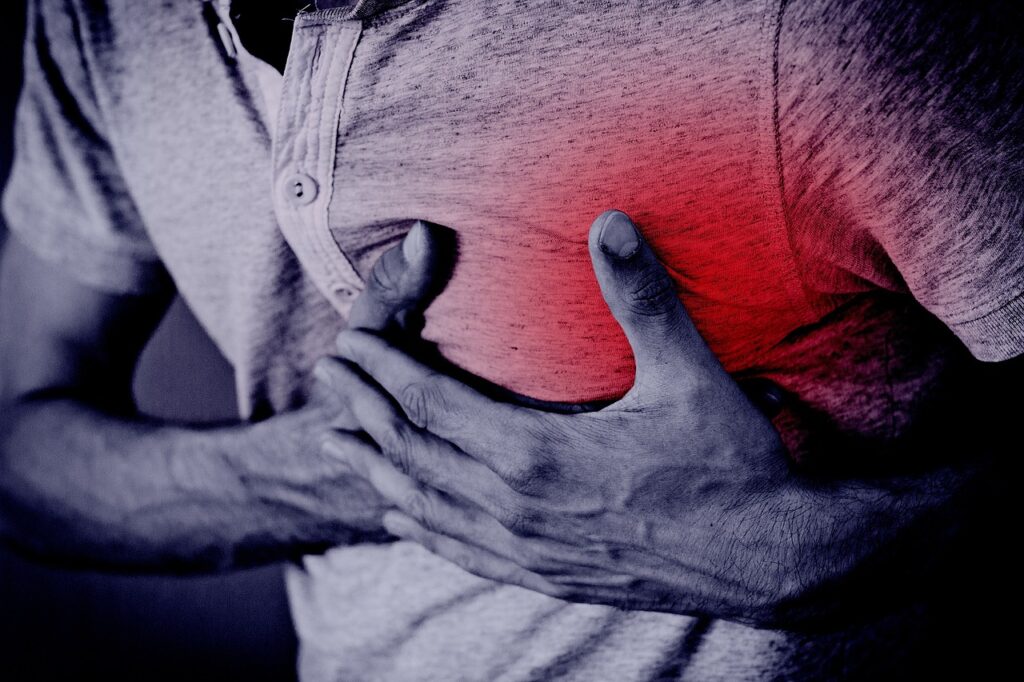Heart attacks are caused by the blood supply to the heart being suddenly interrupted. Without treatment, the heart muscles will experience irreversible damage. Without this supply, heart muscles may be damaged and begin to die. If a large portion of the heart is damaged in this way, the heart stops beating (known as a cardiac arrest), resulting in death. Before a heart attack, one of the plaques ruptures (bursts), causing a blood clot to form at the site of the rupture. The clot may block the supply of blood to the heart, triggering a heart attack. Also there are some studies which showed that gastritis may have caused heart attack.
Coronary artery disease affects the larger coronary arteries on the surface of the heart. Another type of heart disease, called coronary microvascular disease, affects the tiny arteries within the heart muscle. Coronary microvascular disease is more common in women.

Does Excessive Smoking causes Heart Attack or CHD
Smoking also damages other blood vessels. When the arteries supplying blood to the arms and legs are affected, this is called peripheral arterial disease which affects blood circulation. The coronary arteries supply the heart with oxygen and nutrients. Over time, fatty deposits ( plaque ) can build up inside the coronary arteries. Peripheral arterial disease can lead to blood clots, gangrene and even amputation. Without oxygen and nutrients, the heart muscle begins to die. The severity of the heart attack depends on how much heart muscle is permanently damaged.

- Heart attack is more than twice as high as someone who does not smoke.
- Coronary heart disease is significantly increased if you are a woman using the oral contraceptive pill.
- Heart failure (when the heart cannot pump enough blood and oxygen to support other organs).
- Heart attack (when blood flow to the heart becomes blocked and a section of the heart muscle is damaged or dies).
- Peripheral arterial disease, which can lead to gangrene, is increased by more than five times.
- Arrhythmia (when the heart beats too fast, too slow, or irregularly).

Can High-fat diet cause Coronary Heart Disease?
Cutting out high-fat foods can help keep your weight in check and your heart healthy. Staying at a healthy weight can reduce your risk of developing diabetes, heart disease, and other health problems. Most foods have a combination of different fats. You are better off choosing foods higher in healthier fats, such as monounsaturated and polyunsaturated fats. These fats tend to be liquid at room temperature.

How much should you get every day? Here are recommendations from the 2020-2025 Dietary Guidelines for Americans:
- For a 2,000-calorie diet, that is 200 calories or 22 grams (g) of saturated fats a day. As an example, just 1 tablespoon (15 mL) of butter contains 7 g of saturated fat (almost a third of your daily allowance).
- If you have heart disease or high cholesterol, your health care provider may ask you to limit saturated fat even more.
- Saturated fats raise your LDL (bad) cholesterol.
- For a 2,000-calorie diet, that is 200 calories or 22 grams (g) of saturated fats a day. As an example, just 1 tablespoon (15 mL) of butter contains 7 g of saturated fat (almost a third of your daily allowance).
- High LDL cholesterol increases your risk for heart disease and stroke.
- If you have heart disease or high cholesterol, your health care provider may ask you to limit saturated fat even more.
Can Empty Stomach or Being Overweight cause Heart Attack
Leaving the house on an empty stomach increases the risk of potentially deadly heart disease, says a new research. If this happens in the arteries that carry blood to your brain it may lead to a stroke or vascular dementia. It also triggers higher insulin levels in the blood, a warning sign that diabetes could soon set in. Many people tend to worry about the fat they can feel, which sits directly under the skin. This is called subcutaneous fat. But the bigger health risk comes from a different type of fat called visceral fat. This sits around our internal organs such as our heart and liver.

Visceral fat affects can:
- raise your blood cholesterol.
- increase your blood pressure.
- increase your risk of developing type 2 diabetes.
All these risk factors are closely linked with heart and circulatory diseases.
Carrying weight around your middle can make it harder for your body to use a hormone called insulin, which controls your blood glucose (sugar) levels. This can lead to type 2 diabetes. Having high levels of glucose in your bloodstream damages your arteries and increases your risk of heart and circulatory diseases.


Fantastic site A lot of helpful info here Im sending it to some buddies ans additionally sharing in delicious And naturally thanks on your sweat
Amazing blog design, how long have you been blogging? You make it seem so simple. Both the information and the overall appearance of your website are excellent.